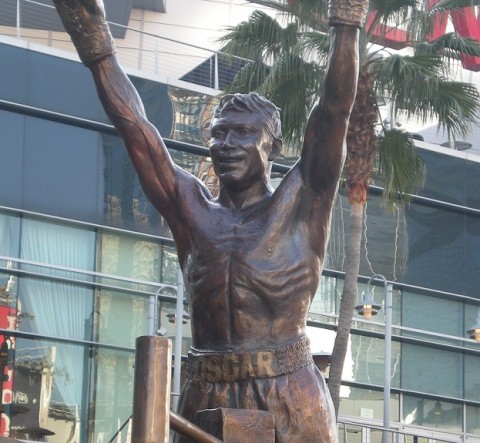When we talk about Diego De La Hoya (now 12-0), it's inevitable to make a comparison to a certain Mexican boxer who excelled at the midrange, entered professional fighting after a long and successful amateur career, and displayed a knack for landing and viciously capitalizing on elegant potshots with the lead hand. Although such a comparison–to cousin and manager Oscar De La Hoya, arguably among boxing's all-time greats–is easy to make, it is still premature. Less-so, however, after September 4th's lopsided unanimous decision over experienced journeyman Jesus Ruiz, (now 34-7-5).
From the second round onwards, Ruiz found himself technically outclassed. While Ruiz threw body shots in an attempt to slow down the highly-mobile De La Hoya, he was unable to find his range, and consistently missed short, leaving himself open to consistent straight rights. When he began to slip laterally in order to avoid De La Hoya's cross, he left himself open to uppercuts from the lead hand, one of the more characteristic examples of this occuring midway through the fourth round.
In round seven, Ruiz opened a cut on De La Hoya's face with an accidental elbow, but De La Hoya's corner was able to close it up. In the 9th round, De La Hoya landed a left hook which wobbled Ruiz. After taking a fortuitious stumble to the inside of De La Hoya's follow-up right and immediately clinching, Ruiz regained his composure and was able to finish out the fight. The judges scored the bout 91-109, 90-110, and 90-110, and Diego De La Hoya took home the vacant WBC Youth Super Bantamweight title, for whatever that's worth.
On Inheritance
It's still too early to tell whether or not Diego De La Hoya will attain his cousin's stature, if we think about it in a statistical way, he probably won't. Being a member of a boxing family seems as though it would be a burdensome thing. It's easy to imagine the pain of an entire array of Omars and Bobbys whose victories echo hollowly within the brobdingnagian footsteps of the Mannys and Julio Césars. On the other hand, maybe that's just me; Joyce Carol Oates wrote beautifully in her 1987 collection of essays, On Boxing, about fighters' radical assumption of personal responsibility. Perhaps the following also extends to familial traits rather than only things which can be ascribed to one's opponent.
"The boxer meets an opponent who is a dream-distortion of himself in the sense that his weaknesses, his capacity to fail and to be seriously hurt, his intellectual miscalculations—all can be interpreted as strengths belonging to the Other; the parameters of his private being are nothing less than boundless assertions of the Other’s self."
Of course, there's not really any way to know without actually being one of these people. This is a sport full of what we in the computational sciences term black boxes, obscure processes which we can only know by their outputs. We can never know what goes on inside the box, whether or not the box represents Cus D'Amato's gym, a cornerman speaking in a language you don't know, or even a given boxer's internal state. If I can be forgiven for taking Manny Pacquiao grossly out of context, "Only God knows that. He is the only one who knows. He is only one who will know. And he is the only one who does know."
Diego and others like him, no matter the skill they attain, do not stack up with what we believe a great boxer is. In the best case, these second children of fate assume a mantle which has been laid out for them. In the worst, they squander a great inheritance. Perhaps most damningly, if they're watched from birth for the signs which characterized their predecessors, they can't surprise us. I imagine a teenage Bobby Pacquiao putting his left hand through a granite countertop in a fit of pubescent rage, or Julio César Chávez, Jr. methodically cutting off the playpen on another toddler.
Perhaps when we watch people for these qualities, we aren't disappointed because we've revised our expectations upwards, but because we've incorporated the understanding that greatness is not necessarily unique. Knowing that somebody can equal our heroes diminishes them in some sense. We want these children, uncles, and younger brothers to fail, or we want them to shatter the legacy of their forebears beyond all recognition. We never just want another Floyd Jr—we were completely satisfied with the first. (Although I, for one, could have done without him entirely.)
If I wanted to, I could put a paragraph here which ruminated endlessly as to whether or not this bout adequately demonstrated Diego's possession or lack of Oscar's intangible qualities: his killer instinct, his fearlessness, his warrior's heart, his left hook. I will not, because we have not yet learned these things. What we learned is this: Diego De La Hoya is fast on his feet, he's smart, hits hard, and is fun to watch. I look forward to his next fight.
Image Credit: Tony (Flickr), via Wikimedia Commons

Add comment